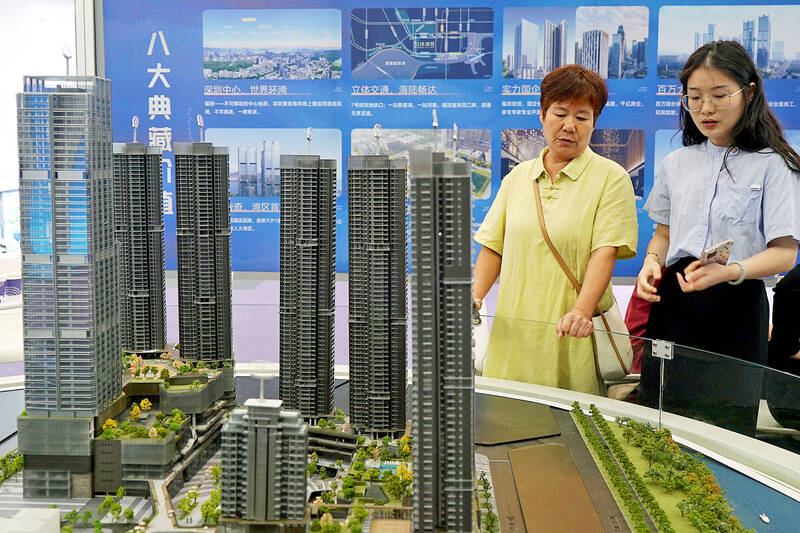China is planning to cut taxes for home purchases as the government dials up fiscal support to revive a moribund housing market, people familiar with the matter said.
Regulators are working on a proposal that would allow mega cities including Shanghai and Beijing to cut the deed tax for buyers to as low as 1 percent from as much as 3 percent, the people said.
City governments have leeway to tweak the rules, they added.

Photo: Reuters
The plan, hinted at on Friday by Chinese Minister of Finance Lan Foan (藍佛安), underscores Beijing’s increased willingness to use fiscal tools to shore up the sluggish economy along with monetary easing.
Under the latest proposal, top-tier cities are expected to be allowed to scrap the distinction between ordinary and luxury homes, which would substantially lower purchasing costs for people seeking to upgrade their residences, people familiar with the matter said.
In Shanghai for example, apartments bigger than 144m2 are considered “non-ordinary.”
If realized, the move would help reduce cost of home buying and boost property sales, said Raymond Cheng (鄭懷武), head of China property research at CGS International Securities Hong Kong Ltd (銀河證券).
A years-long property crash has wiped out billions of dollars in household wealth, adding to deflationary pressures. Economists are calling for more fiscal support to ensure China’s about 5 percent economic growth target is met this year.
The property deed tax cut is consistent with earlier expectations that the government would issue fiscal policies helping the property sector, Morningstar Inc analyst Jeff Zhang said.
The plan to cut property taxes is set to reignite investors’ expectations for large-scale stimulus to boost domestic demand and combat deflation after last week’s high-profile legislative meeting fell short of market forecasts.
China in the past two months unleashed its strongest package of policies to boost the property market, including cutting borrowing costs on existing mortgages, relaxing buying curbs in big cities and easing down payment requirements.
Last month, residential property sales rose for the first time this year, suggesting that support measures were helping to inject some confidence in buyers. That said, the recovery was lopsided, with state developers benefiting the most from the stimulus and buyers preferring existing homes.
The country also pledged last month to nearly double the loan quota for unfinished residential projects to 4 trillion yuan (US$552.87 billion). The announcement underwhelmed due to a lack of concrete numbers for special bonds to enable local governments to digest about 60 million unsold units.

Semiconductor business between Taiwan and the US is a “win-win” model for both sides given the high level of complementarity, the government said yesterday responding to tariff threats from US President Donald Trump. Home to the world’s largest contract chipmaker, Taiwan Semiconductor Manufacturing Co (TSMC, 台積電), Taiwan is a key link in the global technology supply chain for companies such as Apple Inc and Nvidia Corp. Trump said on Monday he plans to impose tariffs on imported chips, pharmaceuticals and steel in an effort to get the producers to make them in the US. “Taiwan and the US semiconductor and other technology industries

SMALL AND EFFICIENT: The Chinese AI app’s initial success has spurred worries in the US that its tech giants’ massive AI spending needs re-evaluation, a market strategist said Chinese artificial intelligence (AI) start-up DeepSeek’s (深度求索) eponymous AI assistant rocketed to the top of Apple Inc’s iPhone download charts, stirring doubts in Silicon Valley about the strength of the US’ technological dominance. The app’s underlying AI model is widely seen as competitive with OpenAI and Meta Platforms Inc’s latest. Its claim that it cost much less to train and develop triggered share moves across Asia’s supply chain. Chinese tech firms linked to DeepSeek, such as Iflytek Co (科大訊飛), surged yesterday, while chipmaking tool makers like Advantest Corp slumped on the potential threat to demand for Nvidia Corp’s AI accelerators. US stock

The US Federal Reserve is expected to announce a pause in rate cuts on Wednesday, as policymakers look to continue tackling inflation under close and vocal scrutiny from US President Donald Trump. The Fed cut its key lending rate by a full percentage point in the final four months of last year and indicated it would move more cautiously going forward amid an uptick in inflation away from its long-term target of 2 percent. “I think they will do nothing, and I think they should do nothing,” Federal Reserve Bank of St Louis former president Jim Bullard said. “I think the

SUBSIDIES: The nominee for commerce secretary indicated the Trump administration wants to put its stamp on the plan, but not unravel it entirely US President Donald Trump’s pick to lead the agency in charge of a US$52 billion semiconductor subsidy program declined to give it unqualified support, raising questions about the disbursement of funds to companies like Intel Corp and Taiwan Semiconductor Manufacturing Co (台積電). “I can’t say that I can honor something I haven’t read,” Howard Lutnick, Trump’s nominee for commerce secretary, said of the binding CHIPS and Science Act awards in a confirmation hearing on Wednesday. “To the extent monies have been disbursed, I would commit to rigorously enforcing documents that have been signed by those companies to make sure we get